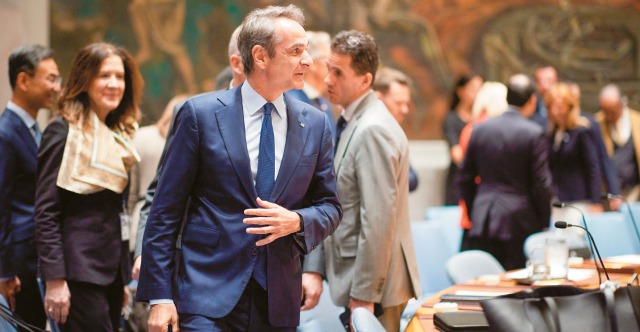The recent Marc survey for “THEMA” reveals a bipartisan agreement on suspending public sector tenure. Prime Minister Kyriakos Mitsotakis has opted to leverage constitutional matters to politically challenge PASOK and direct the ideological narrative.
As the constitutional revision process approaches, the government is announcing a wide range of interventions, particularly with the push for non-state, non-profit universities. To successfully revise the Constitution, 180 MPs will be essential at some stage of the process.
According to Thematos, the government plans to initiate discussions on constitutional revision by late 2025, making 2026 a pivotal year for debates on post-election amendments. The current Parliament will select which articles are eligible for revision, while the next Parliament will determine how they change. If an article is deemed revisable now with 180 votes, it will require only 151 votes for modification in the next Parliament. However, if a supermajority isn’t secured now, 180 votes will be necessary the following year.
This indicates that broader consensus will be essential, although theoretically, the ruling coalition, comprising N.D. (155 MPs) and PASOK (33 MPs), could reach the necessary votes.
This autumn, decisions regarding who will guide the revision process for New Democracy will be made in coordination with the Maximou building.
Recent discussions have involved notable figures such as Dimitris Avramopoulos, the current President, Kostas Tasoulas, and former MP Kostas Tzavara. Key roles will likely be fulfilled by Prime Minister’s Secretary General Stelios Koutnatzis and Foreign Minister Giorgos Gerapetritis, alongside legal advisors including government spokesman Pavlos Marinakis and Deputy Prime Minister Giorgos Mylonakis.
Universities, Public Sector, and Ministerial Considerations
Throughout his tenure, Mitsotakis has clearly expressed his ambition to implement significant constitutional reforms, leveraging the New Democracy’s majority to shape the agenda. In light of the push for non-state universities, he has proposed revising Article 16, challenging PASOK while realizing that Left parties are unlikely to offer support.
In terms of public sector reforms, he advocates changes to Article 103 paragraph 4, emphasizing that the removal of tenure should apply to all civil servants, both new hires and current employees.
Government sources note that civil servants can currently only be dismissed after a Disciplinary Board’s ruling or final criminal conviction, a process that is often lengthy and costly.
Additionally, they are open to further legislative interventions following any constitutional adjustments to streamline the dismissal of civil servants assessed as inactive.
Among the proposed changes are revisions to Article 86, aiming to minimize Parliament’s involvement when the judiciary seeks to prosecute political figures. Following this line, Mitsotakis introduced the Triantopoulos model, which will be applied to former Infrastructure and Transport Minister Kostas Ach. Karamanlis.
Mitsotakis is also considering revisions to Article 90, relating to the election of judicial leaders, per PASOK’s proposals. He has noted Article 24, which addresses environmental protection, emphasizing the need for a new synergy between urban planning and environmental considerations.
Moreover, he previously indicated intentions to amend Article 30, which pertains to the election of the President of the Republic, suggesting a single six-year term for this office. Meanwhile, government officials are looking to revise Article 51 to constitutionally guarantee postal voting for national elections, as successfully demonstrated in the 2024 European elections.
Challenges and Evaluations
Recognizing the hesitance of opposition parties, particularly PASOK, regarding public sector reform, Mitsotakis is taking a strategic approach aimed at centrist voters. Notably, former minister Kostas Skandalidis’ recent endorsement of civil service tenure removal has created considerable pressure on PASOK’s leadership.
The government is actively pursuing public sector reforms, aware that both private employees and freelancers are advocating against treating the state as an untouchable entity. Many civil servants are also calling for evaluations to aid in career advancement.
On Friday, Deputy Prime Minister Kostis Hatzidakis announced an expansion of productivity bonuses for civil servants in significant roles, while the Interior Ministry, through Minister Theodoros Livanios, is unveiling a new design for Public Disciplinary Courts, aiming to expedite the resolution of lingering cases.
Ultimately, the government aims to avoid getting bogged down in the single-issue agenda that opposition parties are emphasizing. Recent polls, including Metron Analysis for MEGA and Opinion Poll for ACTION24, indicate that ND is maintaining a lead, enabling the party to engage meaningfully with critical voter demographics.
In this context, the government is crafting an agenda around issues that can politically benefit it while placing pressure on opposition parties. It plans to maintain this momentum, with the next significant event being the Cabinet meeting scheduled for next Wednesday.
Ask me anything
Explore related questions

















